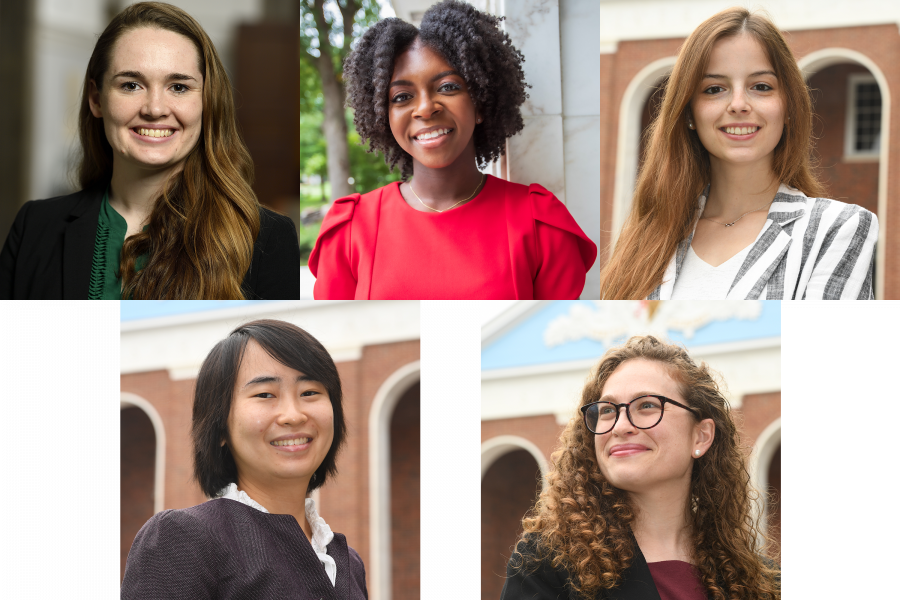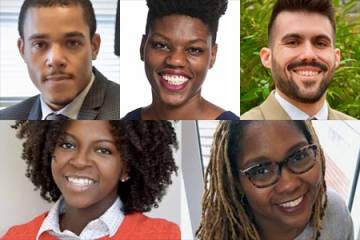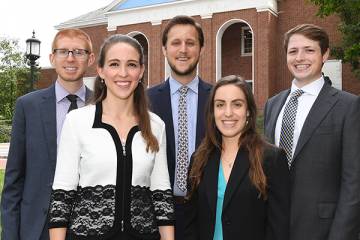Five Johns Hopkins PhD students have been named Siebel Scholars for 2021, an award that recognizes them as being among the world's top graduate students in the fields of business, bioengineering, computer science, and energy science. Selected for their outstanding academic performance and demonstrated leadership, Siebel Scholars receive a financial award of $35,000 to support their final year of studies.
Since its founding in 2000, the Siebel Scholarship has been awarded to 60 Johns Hopkins graduate students. This year's awardees from Johns Hopkins are among 92 winners from leading universities.
"These are tremendously accomplished engineering students," says Ed Schlesinger, dean of the Whiting School of Engineering. "Their academic and research achievements and the promise they demonstrate are exceptional, and it's wonderful to see them honored in this way."
The Siebel Scholarship winners from Johns Hopkins are:
Inês Godet
Inês Godet completed her degree in biological engineering at the Instituto Superior Tecnico, where she was distinguished for her academic and research performance. She came to Hopkins to conduct graduate research in the lab of Vice Provost for Research Denis Wirtz and joined the PhD program in the Department of Chemical and Biomolecular Engineering under adviser Daniele Gilkes. She investigates the role of hypoxia in breast cancer metastasis. Her research has led to six peer-reviewed publications, including recently in Nature Communications. Godet has earned recognition with an international EACR bursary and six top presentation awards. She has mentored 11 students, two of whom earned Provost's Undergraduate Research Awards. Godet is a member of the Rapid Autopsy Program at Hopkins and is on call 24 hours a day to preserve critical samples whose study will shape the future of cancer research. Godet is an active board member of the Portuguese American Postgraduate Society and supports the academic development of Portuguese graduates in North America.
Bria Macklin
Bria Macklin graduated from North Carolina A&T State University with a bachelor's degree in bioengineering and is now a PhD candidate in the Department of Chemical and Biomolecular Engineering under adviser Sharon Gerecht at Johns Hopkins University. Her thesis focuses on understanding the regenerative potential of stem cell-derived vascular cells and has received the NIH/NHLBI Ruth L Kirschstein Predoctoral (F31) Award for her work. Throughout her time at JHU, Macklin has remained passionate about leadership and service, holding positions on many committees and organizations. She has played a leading role in efforts to increase diversity amongst graduate students and in academia, including serving as the co-chair of the Black Graduate Student Association and a Graduate Diversity Fellow and serving on the Diversity Leadership Council and the Homewood Council for Inclusive Excellence. Macklin is committed to mentoring the next generation of scientists, with many of her mentees winning major awards for their research accomplishments and continuing on to PhD programs.
Yuan Rui
As a PhD candidate in the Department of Biomedical Engineering under adviser Jordan Green, Yuan Rui devotes her studies to designing biomaterials for the delivery of protein and nucleic acid drugs to treat diseases such as cancer and genetic disorders. She conducts research in the Johns Hopkins Institute for NanoBioTechnology and the Translational Tissue Engineering Center. Working with her peers and mentees (who include six undergraduates and two high school students), she has published 18 peer-reviewed articles, including 10 as first or co-first author. As an instructor, she has led a Hopkins Engineering Applications and Research Tutorials course and a winter intersession course and most recently taught a high school course online this past summer. Outside the lab, Yuan has served as co-chair of the graduate student group BME EDGE, which stands for Extramural Development in Graduate Education and connects current BME PhD students with non-academic career tracks. She has also served as the president of the Translational Tissue Engineering Center Student Council, organizing alumni career talks, monthly journal club meetings, and an international potluck.
Alexandra Sneider
Alexandra Sneider graduated with a BS in chemical engineering from the University of Massachusetts Lowell and a BA in archaeology from Harvard University. As a PhD candidate and National Science Foundation Graduate Research Fellow in the Department of Chemical and Biomolecular Engineering at Johns Hopkins, Sneider created a new field of exploration joining exosomes, cancer metastasis, and mechanobiology under adviser Denis Wirtz. Additionally, she utilized a deep learning algorithm to connect laboratory mechanical measurements with the clinical diagnosis of breast cancer. Sneider has published five manuscripts, was an invited speaker at five conferences, mentored 14 students, and collaborated with six laboratories from domestic and international institutions. Outside the lab, Alexandra co-founded Women of Whiting, a university-wide professional development organization, and grew the organization to include more than 200 members in just two years. She is actively involved in departmental and university recruitment efforts. Sneider has received the Diversity Recognition Award and the Outstanding Teaching Assistant Award at Johns Hopkins. She received a Paul V. Renoff Fellowship and was named honorable mention for the Rachel S. Core Award.
Sarah Somers
Throughout Sarah Somers' PhD work in the lab of Warren Grayson in the Department of Biomedical Engineering, she has applied her scientific curiosity to engineering skeletal muscle tissue grafts using biophysical cues, leading to 10 co-authored publications and several conference presentations. However, her time away from the bench inciting this same scientific curiosity in others has been equally fulfilling. Through leadership in on-campus organizations, such as the Translational Tissue Engineering Center Student Council and the Biomedical Engineering PhD Council, Somers has organized academic, social, and career events for her peers. Additionally, she has worked to inspire the next generation of scientists through mentorship and education. She has co-created an intersession course to train undergraduates on key image analysis tools for research and mentored 15 graduate, undergraduate, and high school students in the lab, including those from the Diversity and Academic Advancement Summer Institute. These experiences have re-doubled Somers' enthusiasm to explore scientific questions and expose others to the impactful field of bioengineering.
Posted in Science+Technology
Tagged phd, siebel scholars, graduate education










